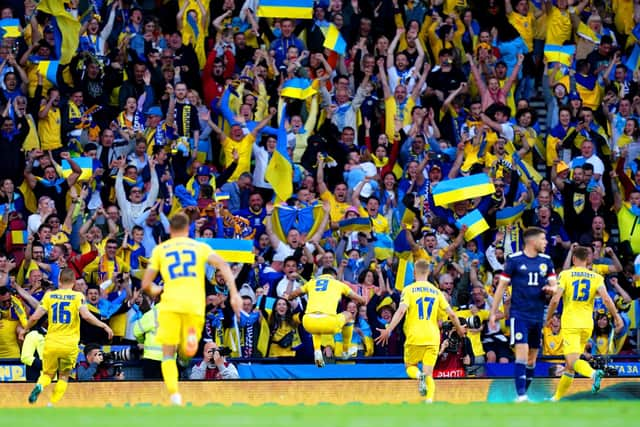Scotland's booing of Ukraine: How it placed the evening firmly in the context befitting of its primary purpose
Molten hype was layered over the appearance of Ukraine, in the midst of an horrendous conflict being waged on them by Russia, facing Scotland at Hampden in the teams’ World Cup play-off semi-final. Oodles of words and opinions proffered in the build-up understandably centred on the emotions, motivations and, often, the very justifications to be picked over in assessing a sporting contest staged as the eastern European nation is being treated as deadly sport by its warmongering neighbour.
Yet, it was the simple act of booing that placed the evening firmly in the context ultimately befitting of its primary purpose. The Ukrainian players were given a warm ovation by the home denizens on making their way out of the tunnel with each draped in a national flag that has become a symbol of a struggle for freedom against tyranny. The national anthem was then accorded respect from those same fans as it was belted out, from the depths of their hearts, by the 3,500 Ukranian supporters. As these welcome visitors did so, to a one they seemed to hold aloft their yellow and blue national emblem. Mercifully, it must be said, the Tartan Army resisted the misguided suggestion they attempt to singalong with a phonetic word sheet.
Advertisement
Hide AdAdvertisement
Hide AdIn the seconds that followed, though, a switch seemed to be flicked – powered by the Ukrainian players going into a huddle just ahead of kick off. It was an act that lead Hampden suddenly to resound to a cacophony of boos and jeers at the act. And, in that very moment, a small sense of normality surely craved above all else by Ukrainians as their world is turned upside down by a brutal occupier proved to the fore.


It remained so as the visitors belied the enormous issues that had impinged on their preparations to demonstrate a prowess that was matched by the impoverished nature of Steve Clarke’s men for so much of the encounter. That superiority allowed them to make it 2-0 within three minutes of the restart. Celebrations of the strike were marked by goalscorer Roman Yaremchuk and his team-mates bounding off the pitch and burying themselves in the sea of their ecstatic supporters. It was a scene to have any neutrals developing a lump in their throat. But the Scotland faithful weren’t in that camp. And so cue the same reaction from the rest of the ground that had greeted their earlier huddle: a chorus of boos, angry, exasperated boos.
It might sound daft to say so – but it certainly should not be considered unkind to say so – but the Scotland faithful then expressing their agonies in such fashion as they digested certain World Cup elimination had a pure resonance that reflected how sport can exist in a bubble, no matter what is going on in the outside world. For the Tartan Army then treating their vanquishers precisely as they would any all-too-good opponent – a reality reflected in their eventual 3-1 victory – was to accord them a genuine respect. Football can be curious that way, but it must always be remembered that it is only a game. Even if followers of both Ukraine and Scotland, for very different reasons, might not see it that way in the aftermath.